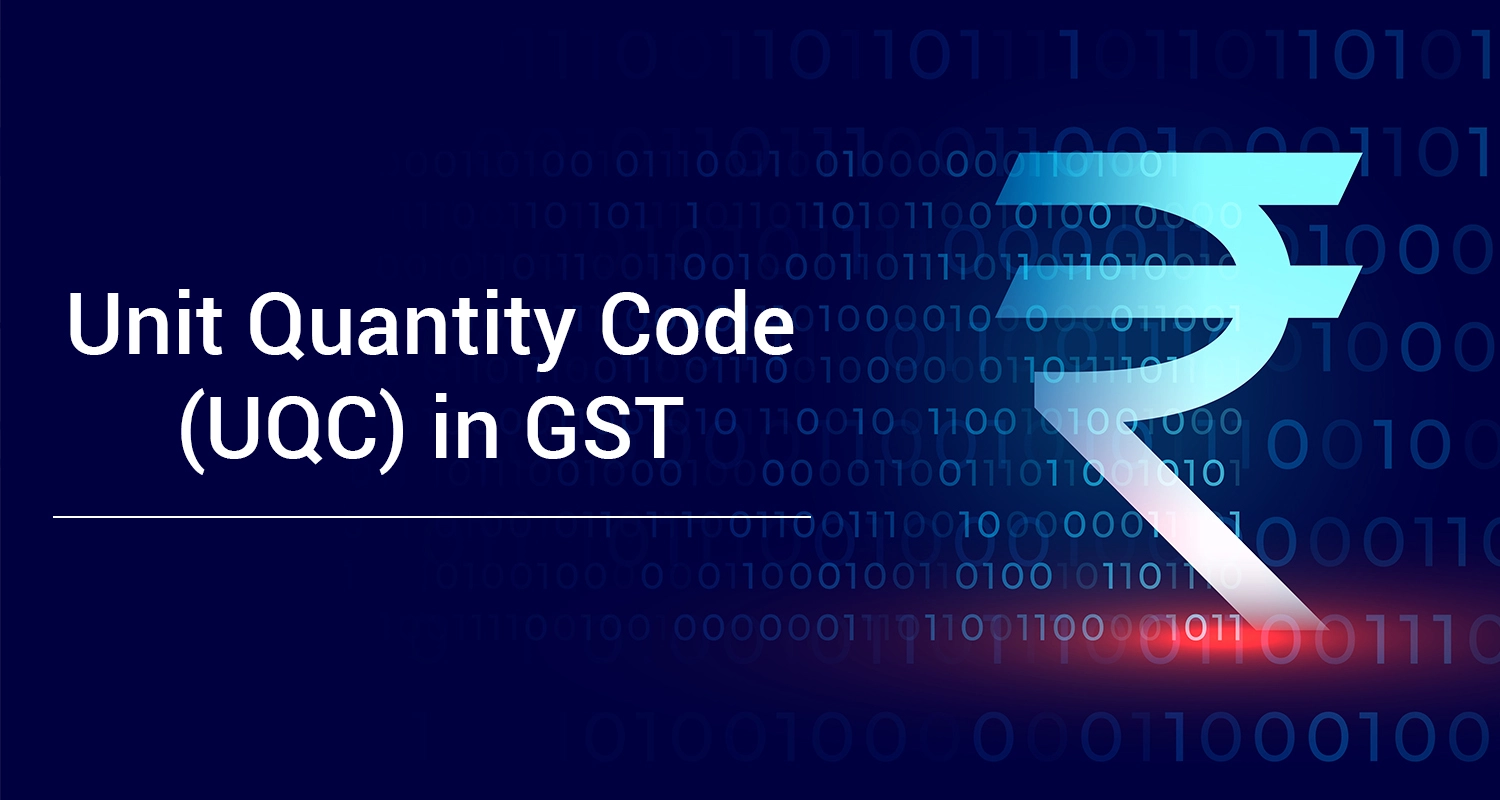Unit Quantity Code (UQC) in GST

Where Goods and Services Tax (GST) in India is concerned, efficient and accurate reporting is crucial for compliance and smooth operations. One essential aspect of this reporting involves the use of Unit Quantity Codes (UQC). The UQC in GST plays a pivotal role in standardizing the measurement units used across various transactions, ensuring consistency and clarity.
What is UQC in GST?
The UQC full form in GST is "Unit Quantity Code." It is a standardized code system used to represent the units of measurement for goods and services in GST returns. The primary objective of implementing UQCs is to harmonize the diverse units of measurement used by businesses across the country, thereby facilitating easier and more accurate tax reporting.
Importance of Unit Quantity Code in GST
The implementation of the Unit Quantity Code in GST is significant for several reasons:
- Standardization: UQCs help in standardizing the measurement units across different businesses and industries, reducing discrepancies and confusion in tax reporting.
- Clarity in Transactions: Standardized codes make understanding the quantity and unit of measurement for goods and services being transacted easier.
- Ease of Compliance: A uniform code system simplifies GST compliance for businesses and reduces the chances of errors in returns.
- Data Accuracy: Accurate data entry and reporting are ensured when everyone uses the same codes for similar units of measurement, aiding in better tax administration and auditing processes.
Sapna aapka. Business Loan Humara.
Apply NowCommon UQCs and Their Usage
The Unit Quantity Code in GST covers various measurement units used in various industries. Here is the list of UQCs:
|
UQC |
Description |
UQC |
Description |
UQC |
Description |
|
BAG |
BAGS |
GGR |
GREAT GROSS |
ROL |
ROLLS |
|
BAL |
BALE |
GMS |
GRAMS |
SET |
SETS |
|
BDL |
BUNDLES |
GRS |
GROSS |
SQF |
SQUARE FEET |
|
BKL |
BUCKLES |
GYD |
GROSS YARDS |
SQM |
SQUARE METERS |
|
BOU |
BILLIONS OF UNITS |
KGS |
KILOGRAMS |
SQY |
SQUARE YARDS |
|
BOX |
BOX |
KLR |
KILOLITRE |
TBS |
TABLETS |
|
BTL |
BOTTLES |
KME |
KILOMETRE |
TGM |
TEN GRAMS |
|
BUN |
BUNCHES |
MLT |
MILLILITRE |
THD |
THOUSANDS |
|
CAN |
CANS |
MTR |
METERS |
TON |
TONNES |
|
CBM |
CUBIC METER |
MTS |
METRIC TON |
TUB |
TUBES |
|
CCM |
CUBIC CENTIMETER |
NOS |
NUMBERS |
UGS |
US GALLONS |
|
CMS |
CENTIMETER |
PAC |
PACKS |
UNT |
UNITS |
|
CTN |
CARTONS |
PCS |
PIECES |
YDS |
YARDS |
|
DOZ |
DOZEN |
PRS |
PAIRS |
OTH |
OTHERS |
|
DRM |
DRUM |
QTL |
QUINTAL |
Each of these codes represents a specific unit of measurement, allowing businesses to report their quantities consistently.
How to Use UQC in GST Returns
When filing GST returns, businesses are required to report the quantity of goods using the appropriate UQC. Here is a step-by-step guide on how to use UQCs in GST returns:
- Identify the Correct UQC: Determine the correct UQC for the unit of measurement used in your transactions. This can be done by referring to the list of standard UQCs provided by the GST authorities.
- Report in Invoices: When issuing invoices, include the quantity of goods and the corresponding UQC. For example, if you sell 10 kilograms of rice, you would report it as "10 KGS."
- Enter GST Returns: While filing GST returns (GSTR-1, GSTR-3B, etc.), ensure that the quantities are reported using the standardized UQCs. This ensures uniformity and avoids discrepancies during tax assessments.
Benefits of Using UQCs
Using Unit Quantity Codes in GST offers several benefits:
- Enhanced Consistency: UQCs bring uniformity in reporting quantities, making it easier for businesses and tax authorities to understand and verify the data.
- Reduced Errors: With a standardized code system, the chances of errors in reporting quantities are minimized, leading to more accurate GST returns.
- Simplified Compliance: Businesses find it easier to comply with GST regulations when using UQCs, as the standardized codes simplify the reporting process.
- Efficient Auditing: For tax authorities, auditing becomes more efficient with consistent and standardized data, allowing for quicker and more accurate assessments.
Challenges in Implementing UQCs
Despite the numerous benefits, there are some challenges in implementing UQCs:
- Awareness and Training: Businesses need to be adequately trained and made aware of the importance and usage of UQCs. Lack of knowledge can lead to incorrect reporting.
- System Updates: Businesses may need to update their invoicing and accounting systems to incorporate UQCs, which can be a time-consuming and costly process.
- Industry-Specific Needs: Certain industries might have specific units of measurement that are not covered by the standard UQCs, leading to potential issues in reporting.
Addressing the Challenges
To overcome these challenges, the following steps can be taken:
- Education and Training: Regular workshops and training sessions can be organized to educate businesses about the importance and correct usage of UQCs.
- System Integration: Accounting and invoicing software providers should integrate UQC functionality into their systems, making it easier for businesses to use these codes.
- Feedback Mechanism: A feedback mechanism can be established where businesses can report issues or suggest additional UQCs that might be needed for specific industries.
Conclusion
The Unit Quantity Code (UQC) in GST is essential for standardized and accurate tax reporting. By providing a uniform code system for units of measurement, UQCs ensure consistency, reduce errors, and simplify compliance for businesses. While there are challenges in implementation, these can be effectively addressed with proper education, system updates, and feedback mechanisms. Adopting and correctly using UQCs benefits businesses by streamlining their GST reporting and aids tax authorities in efficient tax administration and auditing.
Understanding and integrating UQCs into your GST processes is crucial for maintaining compliance and achieving accurate tax reporting, ultimately contributing to India's more organized and transparent tax system.
FAQs
Q1. What is the UQC full form in GST, and why is it important?Ans. The full form of the UQC in GST is "Unit Quantity Code." It is a standardized code system used to represent units of measurement for goods and services in GST returns. UQCs are important because they ensure consistency and clarity in reporting, reduce discrepancies, simplify compliance, and enhance data accuracy in tax administration.
Q2. How do I determine the correct unit quantity code for my products?Ans. To determine the correct UQC for your products, refer to the list of standard UQCs provided by the GST authorities. This list includes commonly used units such as NOS (Number), KGS (Kilograms), LTR (Liters), MTR (Meters), and more. Select the UQC that accurately represents the unit of measurement used in your transactions.
Q3. How should I report UQCs in my GST invoices and returns?Ans. When issuing invoices, include the goods' quantity and the corresponding UQC. For instance, if you sell 50 pieces of an item, report it as "50 PCS." Similarly, while filing GST returns (such as GSTR-1 or GSTR-3B), ensure that the quantities are reported using the appropriate UQCs to maintain uniformity and avoid discrepancies during tax assessments.
Q4. What are the benefits of using Unit Quantity Codes in GST?Ans. The benefits of using UQCs in GST include enhanced consistency in reporting, reduced errors, simplified compliance, and efficient auditing. By standardizing the measurement units, UQCs make it easier for businesses and tax authorities to accurately understand, verify, and audit the reported data.
Q5. What challenges might businesses face when implementing UQCs, and how can they overcome them?Ans. Businesses may face challenges such as lack of awareness and training, system updates, and industry-specific measurement needs not covered by standard UQCs. To overcome these challenges, businesses can participate in training sessions, update their accounting and invoicing systems to incorporate UQCs, and provide feedback to GST authorities to suggest additional UQCs for specific industry needs.
Sapna aapka. Business Loan Humara.
Apply NowDisclaimer: The information contained in this post is for general information purposes only. IIFL Finance Limited (including its associates and affiliates) ("the Company") assumes no liability or responsibility for any errors or omissions in the contents of this post and under no circumstances shall the Company be liable for any damage, loss, injury or disappointment etc. suffered by any reader. All information in this post is provided "as is", with no guarantee of completeness, accuracy, timeliness or of the results etc. obtained from the use of this information, and without warranty of any kind, express or implied, including, but not limited to warranties of performance, merchantability and fitness for a particular purpose. Given the changing nature of laws, rules and regulations, there may be delays, omissions or inaccuracies in the information contained in this post. The information on this post is provided with the understanding that the Company is not herein engaged in rendering legal, accounting, tax, or other professional advice and services. As such, it should not be used as a substitute for consultation with professional accounting, tax, legal or other competent advisers. This post may contain views and opinions which are those of the authors and do not necessarily reflect the official policy or position of any other agency or organization. This post may also contain links to external websites that are not provided or maintained by or in any way affiliated with the Company and the Company does not guarantee the accuracy, relevance, timeliness, or completeness of any information on these external websites. Any/ all (Gold/ Personal/ Business) loan product specifications and information that maybe stated in this post are subject to change from time to time, readers are advised to reach out to the Company for current specifications of the said (Gold/ Personal/ Business) loan.



